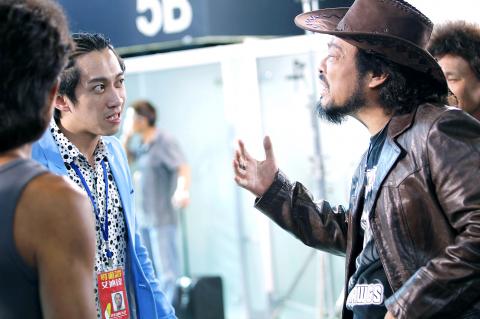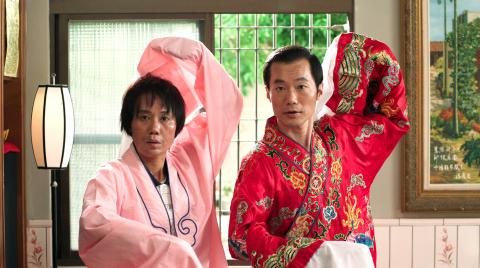As Taiwanese cinema rises from its art-house roots and learns to love its audience, it has become increasingly attractive to investors and grown in number over the past few years. Regrettably, quantity does not necessarily equal quality. The past year saw a slew of badly executed productions such as the slapstick farce Bang Bang Formosa (寶島大爆走), action flick Double Trouble (寶島雙雄) and family dramas Cornflower Blue (藍色矢車菊) and Joyful Reunion (飲食男女—好遠又好近). Though many of these movies received government film subsidies, not many people cared to go to the theater and see how their tax money was being spent.
Even those embraced by audiences didn’t fare well with critics. Box-office hits such as the mega-budgeted Black and White Episode 1: The Dawn of Assault (痞子英雄首部曲:全面開戰) and soap opera-turned-movie, The Fierce Wife Final Episode (犀利人妻最終回), were deemed critical failures.
Criticism aside, there are a number of films that stand out for their substantial stories and unique viewpoints. After tackling traditional Taiwanese mourning rituals in Seven Days in Heaven (父後七日, 2010), director Wang Yu-lin (王育麟) finds inspiration again in the country’s rich popular culture with Flying Dragon, Dancing Phoenix (龍飛鳳舞). This time, gezai opera (歌仔戲), also known as Taiwanese opera, takes center stage. Like Seven Days in Heaven, Wang’s latest film blends comedy with high-energy melodrama and throws in a touch of local zest to weave a flavorful tale about a family-run opera troupe and how its members make the best out of life despite repeated setbacks.

Taipei Times file photo
For his second feature, GF*BF (女朋友。男朋友), director Yang Ya-che (楊雅?) chronicles the lives of three friends over a period of almost 30 years (1985 to 2012), showing how they get caught up in the sociopolitical unrest on the eve of the lifting of martial law and the student movements of the 1990s, to their later acceptance of their place in the world in the new millenium. Though the film is not without its flaws, Yang deserves accolades for creating an ambitious picture about loss and longing with a solid cast led by Kwai Lun-mei (桂綸鎂), Joseph Chang (張孝全) and Rhydian Vaughan (鳳小岳).
Noted for his cinematic exploration of memory and nostalgia, director Hou Chi-jan’s (侯季然) When a Wolf Falls in Love with a Sheep (南方小羊牧場) depicts a sweet, youthful romance that takes place on Taipei’s cram-school street — Nanyang Street (南陽街). Featuring young star Kai Ko (柯震東) and new talent Jian Man-shu (簡嫚書), the film is buoyant to look at with the help of lively animated sequences and visual ingenuities that can be best illustrated in the scene where tens of thousands of paper planes glide through the street. Hou’s penchant for using numbers, symbols of time and old artifacts conjures up the images of Wong Kar-wai (王家衛), and with this stylish flick, the promising director successfully creates a fairytale-like, imaginative world where young love and hope bud and thrive.
With Touch of the Light (逆光飛翔), up-and-coming filmmaker Chang Rong-ji (張榮吉) chooses a simple, honest approach to tell a warm-hearted, inspirational story about the friendship between a melancholy young woman and a talented pianist who lost his eyesight when he was little. Much of the film’s charm comes from the well-cast leads Sandrine Pinna (張榕容) and Huang Yu-siang (黃裕翔), who, in real life, is the first visually impaired person to graduate as a piano major from the National Taiwan University of Arts (台灣藝術大學). Touch of the Light can be seen as an extended version of Chang Rong-ji’s 2008 short film The End of the Tunnel (天黑), which stars the same Pinna and Huang but compacts emotions that linger much longer.

Photo courtesy of Swallow Wings Films
In the realm of documentary film, director Jasmine Lee (李靖惠) spent 13 years following four female Filipino workers whom she first met in 1998 at a nursing home in Taipei. The end result is Money and Honey (麵包情人), which takes an intimate look at the women who work far from home in order to support their families. Lee takes multiple roles in the documentary project, not only as a filmmaker behind the lens, but as an active participant in front of the camera, who befriends the workers and even accompanies them back to their hometowns in the Philippines. As a result of Lee’s extensive on-site filming of her characters, the strength of the documentary lies in its sympathetic, close and almost personal account of the women’s lives. Systemic injustice and discrimination are only touched upon.

Even by the standards of Ukraine’s International Legion, which comprises volunteers from over 55 countries, Han has an unusual backstory. Born in Taichung, he grew up in Costa Rica — then one of Taiwan’s diplomatic allies — where a relative worked for the embassy. After attending an American international high school in San Jose, Costa Rica’s capital, Han — who prefers to use only his given name for OPSEC (operations security) reasons — moved to the US in his teens. He attended Penn State University before returning to Taiwan to work in the semiconductor industry in Kaohsiung, where he

On May 2, Chinese Nationalist Party (KMT) Chairman Eric Chu (朱立倫), at a meeting in support of Taipei city councilors at party headquarters, compared President William Lai (賴清德) to Hitler. Chu claimed that unlike any other democracy worldwide in history, no other leader was rooting out opposing parties like Lai and the Democratic Progressive Party (DPP). That his statements are wildly inaccurate was not the point. It was a rallying cry, not a history lesson. This was intentional to provoke the international diplomatic community into a response, which was promptly provided. Both the German and Israeli offices issued statements on Facebook

May 18 to May 24 Pastor Yang Hsu’s (楊煦) congregation was shocked upon seeing the land he chose to build his orphanage. It was surrounded by mountains on three sides, and the only way to access it was to cross a river by foot. The soil was poor due to runoff, and large rocks strewn across the plot prevented much from growing. In addition, there was no running water or electricity. But it was all Yang could afford. He and his Indigenous Atayal wife Lin Feng-ying (林鳳英) had already been caring for 24 orphans in their home, and they were in

Australia’s ABC last week published a piece on the recall campaign. The article emphasized the divisions in Taiwanese society and blamed the recall for worsening them. It quotes a supporter of the Taiwan People’s Party (TPP) as saying “I’m 43 years old, born and raised here, and I’ve never seen the country this divided in my entire life.” Apparently, as an adult, she slept through the post-election violence in 2000 and 2004 by the Chinese Nationalist Party (KMT), the veiled coup threats by the military when Chen Shui-bian (陳水扁) became president, the 2006 Red Shirt protests against him ginned up by